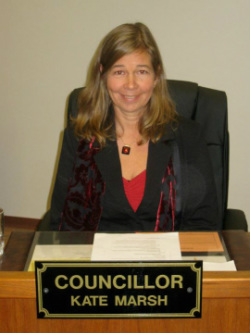And you know that North Cowichan Council has shifted some taxes away from the Heavy Industry Class 4, so we no longer rely on one company (Catalyst Paper) for 26% of our property tax revenues.
Catalyst now pays 16% of NC property taxes. (Still a lot when you consider that if Harmac were to close, the City of Nanaimo would lose less than 2% of their property taxes.) Catalyst is still in Creditor Protection, with their long-term survival by no means certain.
The Council's decision resulted in a shift to the average home of $275. Added to the general operating increase, and the increases in School tax, CVRD etc -- which North Cowichan does not set, but is responsible to collect -- the overall tax increase on the average home (a home assessed at $336,000) is $391 -- or about $116 per $100,000 of assessed value.
Including the shift, my tax bill is up $361 over last year. The amount on my bill directly attributable to the shift is $241.50. In 2011, my overall tax increase was $279.51 -- even though that Mayor and Council had actually raised Class 4's share of taxes.
Obviously, this level of increases going forward is unsustainable. The only saving grace in North Cowichan is that our residential taxes were 5th lowest among 50 comparable communities; so even though we've shifted a large chunk away from Heavy Industry on to residents, we still come out in the lower half.
The bottom line on your overall tax bill, including the shift, should be about 13% more than last year. However, every year BC Assessment re-sets your home's value; so while some folks have seen their assessments go down, others have gone up -- which makes this year's tax increase for them more than 13%.
If this year's increase poses a hardship for you there are options at the end of this blog you might want to consider.
Your bill also varies depending on whether you live in Chemainus, Crofton or the South End, and whether you are on sewer or not.
Still with me? Don't feel bad if you aren't -- the local tax system is complex and in many ways regressive (something I'd like Council to look at). Over the next few months, I will endeavor to explain some of the complexities here. In the meantime, you can try and decipher this chart.
For today, I'm dealing with the tax shift.
The bottom line is, the majority of Council agreed with our CAO (who is a Certified Public Accountant) that not shifting the $275 kept us at an unacceptable level of risk. Hence the shift, which puts us on a sound financial footing. It was a tough decision for all of us -- I personally agonized over it from the moment I knew it was on the table and I'm sure my colleagues went through a similar angst. Nobody wanted to have to do this.
There were members of Council who would have preferred not to shift so much in one year, but only half as much, leaving Catalyst responsible for 21% of our revenues. The opinion was expressed that we might not have to do the second half next year.
There are those who would have the public believe this created a large schism on Council that may not be surmountable. The way I see it, there are many, many decisions that will not be not unanimous. That's the way of democracy.
Each Council member not only has the right, but has the responsibility, to vote with their own conscience based on doing their own due diligence, weighing it with the advice of the expert staff we employ. It's our job to do our best to convey our position to our colleagues and constituents, even to sway them to it if we can. But at the end of the day -- or more accurately, the end of the debate -- its every (wo)man voting their own conscience. There is no inherently right or wrong way of dealing with an issue like this: What constitutes an "acceptable" level of risk is subjective, just like most of the way we look at life.
The professional way to handle any Council decision, once it is ultimately made, is for all members to be behind it after the vote -- no matter how they felt about it before the vote. it behooves us all to work to implement the will of Council, just as staff does. (I suspect they don't always agree with every decision, either.)
I think those of us on Council respect the rights of our colleagues to hold their own views, and vote on issues accordingly -- whether we agree with them or not. Each of us was duly elected by folks who felt we were a good bet, and we are charged to learn to work together as a team.
Partisanship doesn't belong at the local level. We have to move forward -- together. All of Council, Council and staff, and Council and constituents.
If the tax shift puts you in the position of struggling to make ends meet, there are options for many homeowners:
(1) If you have 25% equity in your home and are 55 or older, you may be eligible to defer all or even a portion of your taxes.
Many seniors haven't wanted to do this, and I fully understand that inclination. It seems unfair to me that we've created a situation in North America where many seniors on fixed incomes have become "house rich and cash poor." (But that's another blog topic.)
(2) If you have 25% equity in your home and children 18 or under, you can defer all or part of your taxes until your youngest child is over 18.
(3) There are also deferral options for persons with disabilities. Contact the municipality for more information about them.

 RSS Feed
RSS Feed
